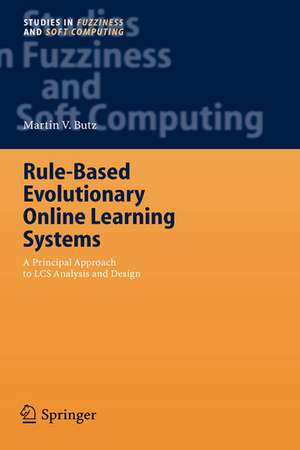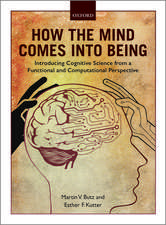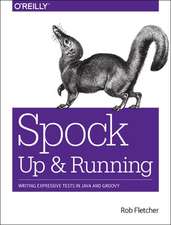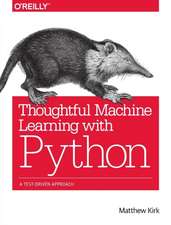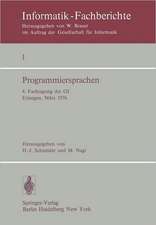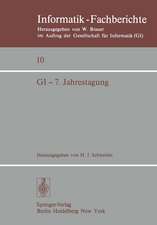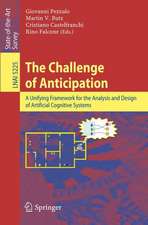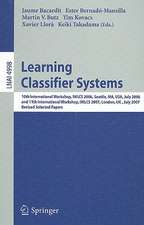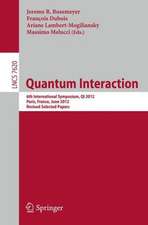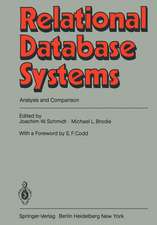Rule-Based Evolutionary Online Learning Systems: A Principled Approach to LCS Analysis and Design: Studies in Fuzziness and Soft Computing, cartea 191
Autor Martin V. Butzen Limba Engleză Hardback – 24 noi 2005
| Toate formatele și edițiile | Preț | Express |
|---|---|---|
| Paperback (1) | 645.14 lei 6-8 săpt. | |
| Springer Berlin, Heidelberg – 12 feb 2010 | 645.14 lei 6-8 săpt. | |
| Hardback (1) | 651.57 lei 6-8 săpt. | |
| Springer Berlin, Heidelberg – 24 noi 2005 | 651.57 lei 6-8 săpt. |
Din seria Studies in Fuzziness and Soft Computing
- 20%
 Preț: 999.85 lei
Preț: 999.85 lei - 20%
 Preț: 653.06 lei
Preț: 653.06 lei - 20%
 Preț: 872.98 lei
Preț: 872.98 lei - 20%
 Preț: 930.57 lei
Preț: 930.57 lei - 20%
 Preț: 1051.00 lei
Preț: 1051.00 lei - 20%
 Preț: 992.44 lei
Preț: 992.44 lei - 20%
 Preț: 655.85 lei
Preț: 655.85 lei - 20%
 Preț: 1001.86 lei
Preț: 1001.86 lei - 18%
 Preț: 954.14 lei
Preț: 954.14 lei - 20%
 Preț: 330.10 lei
Preț: 330.10 lei - 20%
 Preț: 333.04 lei
Preț: 333.04 lei - 20%
 Preț: 997.56 lei
Preț: 997.56 lei -
 Preț: 391.61 lei
Preț: 391.61 lei - 20%
 Preț: 647.79 lei
Preț: 647.79 lei - 20%
 Preț: 986.01 lei
Preț: 986.01 lei - 18%
 Preț: 958.56 lei
Preț: 958.56 lei - 20%
 Preț: 996.40 lei
Preț: 996.40 lei - 20%
 Preț: 999.35 lei
Preț: 999.35 lei - 15%
 Preț: 646.43 lei
Preț: 646.43 lei - 20%
 Preț: 651.57 lei
Preț: 651.57 lei - 20%
 Preț: 997.89 lei
Preț: 997.89 lei - 15%
 Preț: 641.03 lei
Preț: 641.03 lei - 20%
 Preț: 1009.74 lei
Preț: 1009.74 lei - 20%
 Preț: 992.62 lei
Preț: 992.62 lei -
 Preț: 388.72 lei
Preț: 388.72 lei - 18%
 Preț: 1223.43 lei
Preț: 1223.43 lei - 20%
 Preț: 651.42 lei
Preț: 651.42 lei - 18%
 Preț: 951.59 lei
Preț: 951.59 lei - 18%
 Preț: 948.61 lei
Preț: 948.61 lei
Preț: 651.57 lei
Preț vechi: 814.45 lei
-20% Nou
Puncte Express: 977
Preț estimativ în valută:
124.68€ • 133.32$ • 103.95£
124.68€ • 133.32$ • 103.95£
Carte tipărită la comandă
Livrare economică 18 aprilie-02 mai
Preluare comenzi: 021 569.72.76
Specificații
ISBN-13: 9783540253792
ISBN-10: 3540253793
Pagini: 292
Ilustrații: XXI, 259 p.
Dimensiuni: 210 x 297 x 21 mm
Greutate: 0.59 kg
Ediția:2006
Editura: Springer Berlin, Heidelberg
Colecția Springer
Seria Studies in Fuzziness and Soft Computing
Locul publicării:Berlin, Heidelberg, Germany
ISBN-10: 3540253793
Pagini: 292
Ilustrații: XXI, 259 p.
Dimensiuni: 210 x 297 x 21 mm
Greutate: 0.59 kg
Ediția:2006
Editura: Springer Berlin, Heidelberg
Colecția Springer
Seria Studies in Fuzziness and Soft Computing
Locul publicării:Berlin, Heidelberg, Germany
Public țintă
ResearchCuprins
Prerequisites.- Simple Learning Classifier Systems.- The XCS Classifier System.- How XCS Works: Ensuring Effective Evolutionary Pressures.- When XCS Works: Towards Computational Complexity.- Effective XCS Search: Building Block Processing.- XCS in Binary Classification Problems.- XCS in Multi-Valued Problems.- XCS in Reinforcement Learning Problems.- Facetwise LCS Design.- Towards Cognitive Learning Classifier Systems.- Summary and Conclusions.
Textul de pe ultima copertă
This book offers a comprehensive introduction to learning classifier systems (LCS) – or more generally, rule-based evolutionary online learning systems. LCSs learn interactively – much like a neural network – but with an increased adaptivity and flexibility. This book provides the necessary background knowledge on problem types, genetic algorithms, and reinforcement learning as well as a principled, modular analysis approach to understand, analyze, and design LCSs. The analysis is exemplarily carried through on the XCS classifier system – the currently most prominent system in LCS research. Several enhancements are introduced to XCS and evaluated. An application suite is provided including classification, reinforcement learning and data-mining problems. Reconsidering John Holland’s original vision, the book finally discusses the current potentials of LCSs for successful applications in cognitive science and related areas.
Caracteristici
Provides a comprehensive introduction to Learning Classifiers Systems Principle approach to understand, analyze, and design Learning Classifier Systems Includes supplementary material: sn.pub/extras
